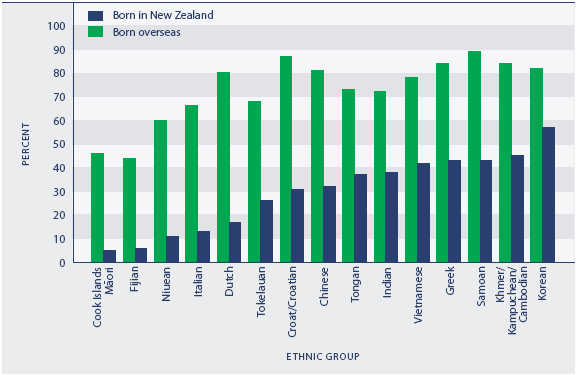Language retention
Definition
The proportion of people who can speak the "first language" (excluding
English) of their ethnic group, for ethnic groups (other than Māori)
with an established resident population in New Zealand, as recorded in
the 2001 Census.
The ability to speak a language is defined as being able to hold an
everyday conversation in that language. First language refers to an
indigenous language associated with a given ethnicity, as opposed to
the first language of a person. Sign language is not treated as a first
language for the purposes of this indicator.
Relevance
The ability to speak the language of one’s identified
ethnicity is an indicator of the ability to retain and pass on one’s
culture and traditions to future generations. Language is a central
component of cultural identity.
Current level
In 2001, the proportion of people who could hold an everyday
conversation in the first language of their ethnic group varied widely
between ethnic groups, from 17 percent of Cook Islands Māori to 81
percent of Koreans. For all ethnic groups, those who were born in New
Zealand were less likely to be able to speak the first language
than those who were born overseas.
Figure Cl3.1 Proportion of people who
could speak the first language of their ethnic group, by birthplace,
2001

Source: Statistics New Zealand (2004a)
Age and sex differences
In all ethnic groups, young people were less likely than older
people to be able to hold an everyday conversation in the first
language of their ethnic group. The proportions were similar for males
and females.
Table CI3.1 Proportion (%) of people in
selected ethnic groups who can speak the fi rst language of their
ethnic group, by age group and sex, 2001
| |
Age (years) |
Sex |
Total |
| |
0–24 |
25–49 |
50+ |
Males |
Females |
|
Pacific peoples
|
| Samoan |
50 |
75 |
89 |
61 |
64 |
62 |
| Cook Islands Māori |
7 |
26 |
53 |
16 |
18 |
17 |
| Tongan |
44 |
66 |
73 |
53 |
54 |
54 |
| Tokelauan |
27 |
57 |
76 |
38 |
43 |
40 |
| Niuean |
13 |
38 |
61 |
24 |
27 |
26 |
Fijian (except Fiji Indian/
Indo-Fijian) |
14 |
36 |
50 |
26 |
26 |
26 |
| Asian |
| Indian |
50 |
70 |
74 |
61 |
63 |
62 |
| Chinese |
59 |
75 |
82 |
67 |
71 |
69 |
| Khmer/Kampuchean/Cambodian |
67 |
85 |
87 |
73 |
79 |
76 |
| Vietnamese |
60 |
82 |
84 |
69 |
74 |
72 |
| Korean |
78 |
84 |
84 |
80 |
82 |
81 |
| European |
| Dutch/Netherlands |
21 |
63 |
81 |
59 |
60 |
59 |
| Greek (incl. Greek Cypriot) |
27 |
73 |
89 |
64 |
61 |
63 |
| Croat/Croatian |
41 |
70 |
81 |
66 |
63 |
65 |
| Italian |
13 |
44 |
70 |
39 |
35 |
37 |
Source: Statistics New Zealand, 2001 Census, unpublished data
|

